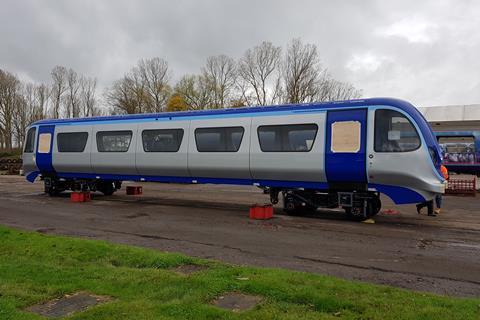
UK: The prototype Revolution Very Light Rail railcar has been delivered to the Quinton Rail Technology Centre at Long Marston, where final assembly, system integration and performance validation testing will be completed by early 2021 ahead of demonstration to potential railway project sponsors and stakeholders.
Revolution VLR is being developed by a consortium led by Transport Design International and including safety body RSSB, leasing company Eversholt Rail, the University of Warwick’s Warwick Manufacturing Group, Coventry-based autonomous pod manufacturer RDM Group, engine supplier Cummins, Prose and Transcal Engineering.
The 18 m long bidirectional vehicle is a more advanced development of a ULR Express railcar which TDI and Severn Lamb supplied in 2015 for transporting factory employees on an industrial line in the Turkish city of Konya.
The RVLR project aims to combine rail and automotive technology to provide a ‘modern, attractive and cost-effective’ vehicle for use on short low-traffic routes where the operation of traditional heavy rail trains or full conversion to light rail standards is deemed to be uneconomic.
It is envisaged that Revolution VLR could be used to enhance services on currently under-used branch lines, to facilitate the reopening of disused lines, and to make it viable to build route extensions to improve rail connectivity to residential and business developments. RSSB has identified 35 routes that could be suitable for VLR, and several operators have expressed interest.
The railcar is designed to minimise weight, and thus infrastructure and operating costs. As a result, operation on lines which are shared with conventional rail vehicles would require specific management procedures. The consortium told Rail Business UK that for non-segregated operation, the hazards and resulting risks would need to be evaluated and appropriate operational and/or engineering mitigations put in place. ’In our view it is unlikely that this would be practical for a route with a high level of conventional traffic, but these are not the target type of route for RVLR deployment’, a spokesperson said. ’For routes with modest levels of other passenger, freight traffic we believe that suitable arrangements should be possible.’
Some of the consortium members are also involved in a separate project supported by Coventry City Council which is developing a prototype Very Light Rail low-floor tram.
-
An in-depth article on the University of Warwick’s role in the Revolution VLR and Very Light Rail projects appeared in the February 2020 issue of Railway Gazette International magazine.



